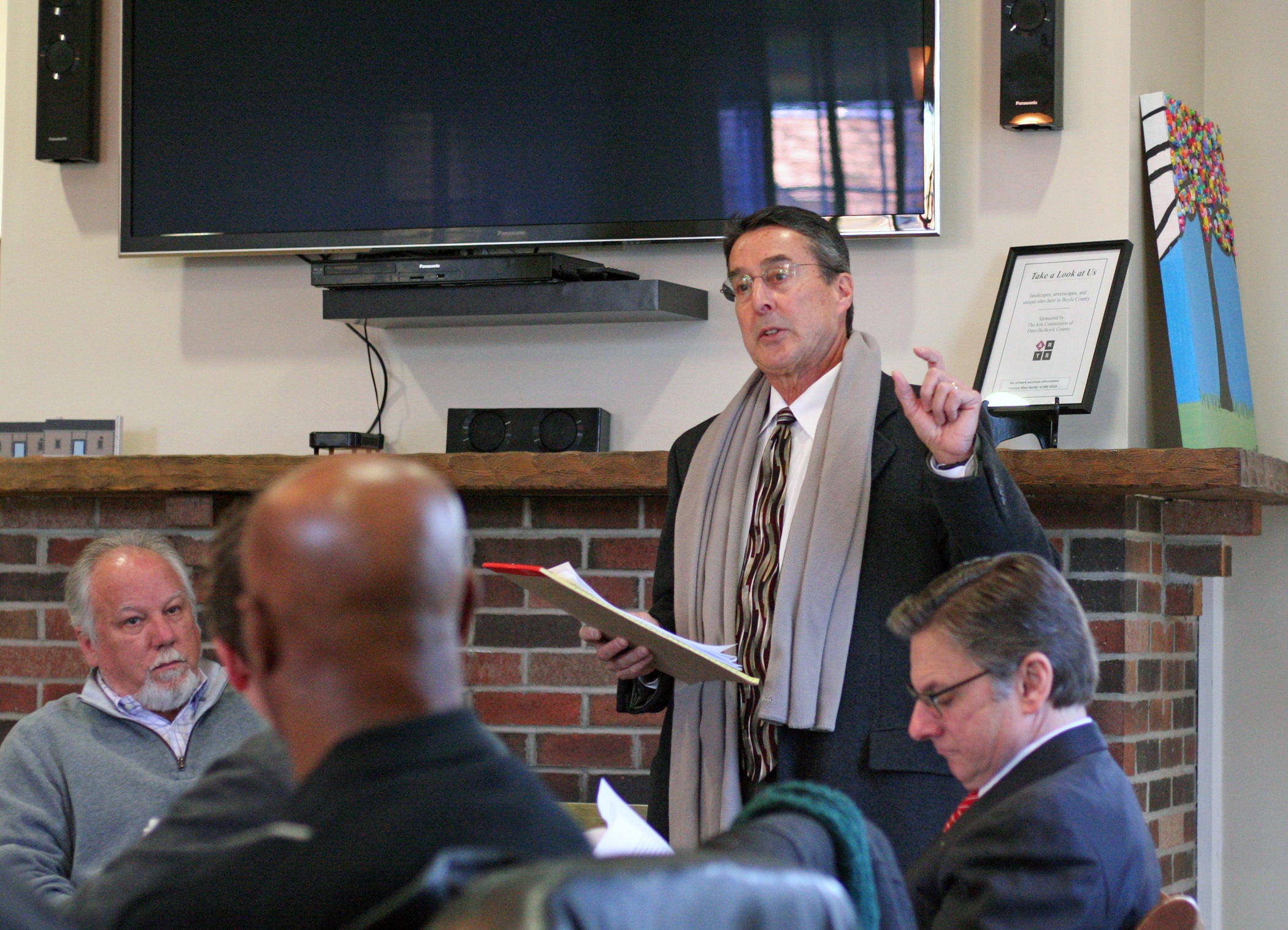EDP board members asked to contact people at state and federal level to fight pipeline repurposing
Published 8:51 am Thursday, December 14, 2017

- Mark Morgan provides an update regarding the Kinder Morgan Pipeline during a December 2017 Economic Development Partnership board meeting. (File photo by Kendra Peek)
Economic Development Partnership members are being asked to throw a little weight around in an effort to help the push against the plan to repurpose a pipeline that runs through the community.
“You know people at the state and federal level,” said Mark Morgan, a local attorney and community activist who has been involved in the ongoing discussions surrounding the pipeline. “The matter’s back for a vote right now.”
Morgan said the Allegheny Defense Project, The Kentucky Resources Council and Kentucky Heartwood have petitioned for a stay, which the Federal Energy Regulatory Commission is considering.
“FERC has indicated they’re going to rule on that, but they’re very reluctant to do it,” he said.
Morgan referenced an article in The Advocate-Messenger, which explains that FERC has a history of granting extensions to itself when asked for a rehearing, waiting until after a project is complete before ruling, and typically ruling in agreement with its original ruling. The initial order FERC issues giving itself more time is called a “tolling order.”
“That’s been their pattern and I don’t see why it would be any different now — unless people in this room have any influence with federal elected officials,” Morgan said.
Morgan said he would get information regarding specifics for sending letters and emails to Ben Nelson, Danville-Boyle County Economic Development Partnership board chair, to distribute to members.
Previously, all partner agencies that made up the EDP board had taken a stand against the plan from companies owned by energy company Kinder Morgan to repurpose 964 miles of pipeline from the northeast, through Kentucky, to the coast of the Gulf of Mexico. This allowed the EDP to take the same stand, said Nelson.
Morgan explained to board members the concerns involving the repurposing of the pipelines.
Natural gas is lighter than ambient air, so in a leak, it goes up. Natural gas liquids (NGLs), which is what would be piped through Tennessee Gas Pipeline No. 1 under the proposal, are different — a portion of the liquids, Morgan said, will turn to gas, while another portion will remain liquids. If there were a leak, he said, experts believe cell phones, car ignitions and other everyday things could cause the gasses to ignite.
Morgan said he has been told NGLs are 100 times more explosive than natural gas and could impact an area up to a half a mile radius from a leak site.
The pipeline is suspended over Lake Herrington (although there are plans to bury the line there), goes through the front yard of Hogsett Elementary School, and past the Parksville Crosspike and Gose Pike, to name a few locations in Boyle County.
“Many of us live within half a mile of this line. Many of our our kids and grandkids go to schools within half a mile,” Morgan said. “That’s the worst case scenarios.”
Morgan said NGLs are a byproduct of fracking in the northeast and the plan is to pump those to the Gulf and sell them to a company in another country, which would use them to make certain kinds of plastics.
An alternative plan, he hopes, is that a plant for processing NGLs could be opened closer to the source.
Morgan stressed that under Kinder Morgan’s proposal, the pipeline would no longer be transporting something that is used for energy in the United States.
Morgan said he had been told that Kinder Morgan was surprised by the pushback that had been received in Kentucky.
“The fracking companies foresaw tremendous resistance if they tried to go to the eastern seaboard and reach a port that way … They anticipated, because of the education level, they would get more push back. They have been surprised at the pushback,” he said. “We are unified. This has been a bipartisan, non-partisan issue.”
In 2016, an ordinance was passed by local governments that requires applicants, such as Kinder Morgan, wishing to move certain hazardous materials through the county to first obtain a conditional use permit from the Danville-Boyle County Planning and Zoning. It was the first of its kind in Kentucky and other communities have since passed similar ordinances.
The ordinance requires the applicants to prove their project fits in well with how the surrounding land is already being used, according to archives of The Advocate-Messenger.
Morgan told board members that the ordinance also puts the burden of paying for expert evaluations on the applicant.
He said the board can also help in providing support to Planning and Zoning, to make sure resources are available.
To be ready in case an application is filed, Morgan said, the Danville City Commission and Boyle County Fiscal Court might need to provide funds on a contingency basis, so they are able to have the experts — a pipeline engineer, a chemical engineer and a geologist — lined up.
“We need to be ready to go. Steve (Hunter, P&Z director) and I have talked about, the board of adjustments normally have to respond to applications in a timely fashion,” Morgan said. “I’m hoping we would leave Mr. Hunter ready to respond quickly so that he had funds soon to go ahead have those people waiting in the wings to consult or call upon.”
He said he hopes those working in Boyle County will be able to coordinate with other communities in Kentucky, such as Madison County, which has passed a similar ordinance.






